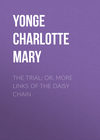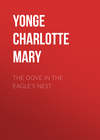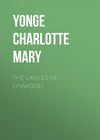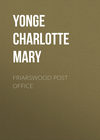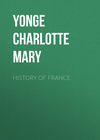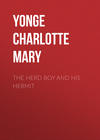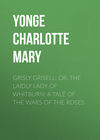Buch lesen: «More Bywords», Seite 8
I shall be curious to hear the result of your throwing the handkerchief.—Your affectionate brother,
E. F.
MISS FULFORD to SIR EDWARD FULFORD
July 24.—I threw the handkerchief by asking Martyn and Mary to spare their daughter. Tears came into Mary’s eyes, the first I ever saw there, and she tried in vain to say something ridiculous. Martyn walked to the window and said huskily, “Dr. A– said it would confirm her health to spend a few winters in the South. Thank you, Charlotte!” They did not doubt a moment, but Martyn feels the parting more than I ever thought he would, and Pica and Uchtred go about howling and bewailing, and declaring that they never shall know where to find anything again.
Avice herself is much more sorrowful than glad, though she is too courteous and grateful not to show herself gracious to me. She did entreat me to take Isa instead, so earnestly that I was obliged to read her your decided objections. It was a blow to her at first, but she is rapidly consoling herself over the wonderful commissions she accepts. She is to observe Mediterranean zoophytes, and send them home on glass slides for the family benefit. She is to send her father photographs and drawings to illustrate his lectures, and Jane has begged for a pebble or rock from S. Paul’s Bay, to show to her class at school. Indeed, I believe Avice is to write a special journal, to be published in the Bourne Parva Parish Magazine; Charley begs for a sea-horse, and Freddy has been instructed by one of the pupils to bargain for nothing less than the Colossus of Rhodes; Metelill is quite as cordial in her rejoicing, and Edith owns that, now it has come to the point, she is very glad to keep her daughter.
And Isa? Well, she is mortified, poor child. I think she must have cried bitterly over the disappointment, for she looked very wretched when we met at dinner.
Meanwhile, Martyn had a walk with Emily, who found that he was very sorry not to be relieved from Isabel, though he knew you were quite right not to take her. He thought Oxford not a good place for such a girl, and the absence of the trustworthy Avice would make things worse. Then Emily proposed to take Isabel back to the Birchwood with her. Grandmamma really likes the girl, who is kind and attentive. There are no young people to whom she could do harm, Emily can look after her, and will be glad of help and companionship. The whole family council agreed that it will be a really charitable work, and that if any one can do her good, it will be the mother and Aunt Emily.
Isa has acquiesced with an overflow of gratitude and affection to them for taking pity on her. It sounds a little fulsome, but I believe some of it is genuine. She is really glad that some one wishes for her, and I can quite believe that she will lose in Avice all that made life congenial to her under Mary’s brisk uncompromising rule. If she can only learn to be true—true to herself and to others—she will yet be a woman to love and esteem, and at Birchwood they will do their best to show that religious sentiment must be connected with Truth.
And so ends my study of the manners of my nieces, convincing me the more that as the manners are, so is the man or woman. The heart, or rather the soul, forms the manners, and they are the man.
C. F.
COME TO HER KINGDOM
‘Take care! Oh, take care!’
Whisk, swish, click, click, through the little crowd at Stokesley on a fine April afternoon, of jocund children just let loose from school, and mothers emerging from their meeting, collecting their progeny after the fashion of old ewes with their lambs; Susan Merrifield in a huge, carefully preserved brown mushroom hat, with a big basket under one arm, and a roll of calico under the other; her sister Elizabeth with a book in one hand, and a packet of ambulance illustrations; the Vicar, Mr. Doyle, and his sister likewise loaded, talking to them about the farmer’s wedding of the morning, for which the bells had been ringing fitfully all day, and had just burst out again. Such was the scene, through which, like a flash, spun a tricycle, from which a tiny curly-haired being in knickerbockers was barely saved by his mother’s seizing him by one arm.
‘A tricycle!’ exclaimed the Vicar.
‘A woman! Oh!’ cried Susan in horror, ‘and she’s stopping—at the Gap. Oh!’
‘My dear Susie, you must have seen ladies on tricycles before,’ whispered her sister.
‘No, indeed, I am thankful to say I have not! If it should be Miss Arthuret!’ said Susan, with inexpressible tones in her voice.
‘She was bowing right and left,’ said the Vicar, a little maliciously; ‘depend upon it, she thought this was a welcome from the rural population.’
‘Hark! here’s something coming.’
The Bonchamp fly came rattling up, loaded with luggage, and with a quiet lady in black seated in it, which stopped at the same gate.
‘The obedient mother, no doubt,’ said Elizabeth. ‘She looks like a lady.’
There had been a good deal of excitement at Stokesley about the property known by the pleasing name of the Gap. An old gentleman had lived there for many years, always in a secluded state, and latterly imbecile, and on his death in the previous year no one had for some time appeared as heir; but it became known that the inheritrix was a young lady, a great-niece, living with a widowed mother in one of the large manufacturing towns in the north of England. Her father had been a clergyman and had died when she was an infant. That was all that was known, and as the house had become almost uninhabitable, the necessary repairs had prevented the heiress from taking possession all this time. It was not a very large inheritance, only comprising a small farm, the substantial village shop, four or five cottages, and a moderate-sized house and grounds, where the neglected trees had grown to strange irregular proportions, equally with the income, which, owing to the outgoings being small, had increased to about £800 or £900 a year, and of course it was a subject of much anxiety with Admiral Merrifield’s family to know what sort of people the newcomers would prove.
Of the large family only the two eldest daughters were at home; Susan, now nearly forty, had never left it, but had been the daughter-of-all-work at home and lady-of-all-work to the parish ever since she had emerged from the schoolroom; her apricot complexion showing hardly any change, and such as there was never perceived by her parents. The Admiral, still a light, wiry, hale man, as active as ever, with his hands full of county, parish, and farming business; an invalid for many years, but getting into that health which is la jeunesse de la vieillesse.
Elizabeth had, from twenty-five to thirty-two, been spared from home by her father to take care of his stepmother in London, where she had beguiled her time with a certain amount of authorship under a nom de plume, and had been introduced to some choice society both through her literary abilities and her family connections.
Four years previous the old lady had died, leaving her a legacy, which, together with her gains, would have enabled her to keep such a home in town as to remain in touch with the world to which she had been introduced; but she had never lost her Stokesley heart enough for the temptation to outweigh the disappointment she would have caused at home, and the satisfaction and rest of being among her own people. So she only went up for an occasional visit, and had become the brightness of the house, and Susan’s beloved partner in all her works.
Her father, who understood better than did her mother and sister what she had given up, had insisted on her having a sitting-room to herself, which she embellished with the personal possessions she had accumulated, and where she pursued her own avocations in the forenoon, often indeed interrupted, but never showing, and not often feeling, that it was to her hindrance, and indeed the family looked on her work sufficiently as a profession, not only to acquiesce, but to have a certain complacency in it, though it was a kind of transparent fiction that MESA was an anagram of her initials and that of Stokesley. Her mother at any rate believed that none of the neighbours guessed at any such thing.
Stokesley was a good deal out of the world, five miles from the station at Bonchamp, over hilly, stony roads, so that the cyclist movement had barely reached it; the neighbourhood was sparse, and Mrs. Merrifield’s health had not been conducive to visiting, any more than was her inclination, so that there was a little agitation about first calls.
The newcomers appeared at church on Sunday at all the services. A bright-faced girl of one-and-twenty, with little black eyes like coals of fire, a tight ulster, like a riding habit, and a small billycock hat, rather dismayed those who still held that bonnets ought to be the Sunday gear of all beyond childhood; but the mother, in rich black silk, was unexceptionable.
Refusing to be marshalled up the aisle to the seat which persistent tradition assigned to the Gap in the aristocratic quarter, daughter and mother (it was impossible not thus to call them) sat themselves down on the first vacant place, close to a surviving white smock-frock, and blind to the bewildered glances of his much-bent friend in velveteen, who, hobbling in next after, found himself displaced and separated alike from his well-thumbed prayer and hymn book and the companion who found the places for him.
‘It ain’t fitty like,’ said the old man confidentially to Susan, ‘nor the ladies wouldn’t like it when we comes in with our old coats all of a muck with wet.’
‘The principle is right,’ said Bessie, when this was repeated to her; ‘but practice ought to wait till native manners and customs are learnt.’
The two sisters offered to save their mother the first visit—leave her card, or make her excuses; but Mrs. Merrifield held that a card thus left savoured of deceit, and that the deed must be womanfully done in person. But she would not wait till the horses could be spared, saying that for near village neighbours it was more friendly to go down in her donkey-chair; and so she did, Bessie driving her, and the Admiral walking with them.
The Gap had, ever since Bessie could remember, been absolutely shrouded in trees, its encircling wall hidden in ivy bushes, over which laburnums, lilacs, pink thorns, and horse chestnuts towered; and the drive from the seldom-opened gate was almost obstructed by the sweeping arms of laurels and larches.
It was obstructed now, but by these same limbs lying amputated; and ‘chop, chop!’ was heard in the distance.
‘Oh, the Arbutus!’ sighed Bessie.
‘Clearing was much needed,’ said her father, with a man’s propensity for the axe.
The donkey, however, thought it uncanny, ‘upon the pivot of his skull, turned round his long left ear,’ and planted his feet firmly. Mrs. Merrifield, deprecating the struggle by which her husband would on such occasions enforce discipline, begged to get out; and while this was going on, the ulstered young lady, with a small axe in hand, came, as it were, to the rescue, and, while the donkey was committed to a small boy, explained hastily, ‘So overgrown, there is nothing to be done but to let in light and air. My mother is at home,’ she added; ‘she will be happy to see you,’ and, conducting them in with complete self-possession—rather, as it occurred to Bessie, as the Queen might have led the way to the Duchess of Kent, though there was a perfect simplicity and evident enjoyment about her that was very prepossessing, and took off the edge of the sense of conceit. Besides, the palace was, to London eyes at least, so little to boast of, with the narrow little box of a wooden porch, the odd, one-sided vestibule, and the tiny anteroom with the worn carpet; but the drawing-room, in spite of George IV furniture, was really pretty, with French windows opening on a well-mown lawn, and fresh importations of knick-knacks, and vases of wild flowers, which made it look inhabited and pleasant. There was no one there, and the young lady proceeded to fetch her mother; and the unguarded voice was caught by Bessie’s quick ears from the window.
‘Here are Admiral and Mrs. Merrifield, and one daughter. Come along, little mammy! Worthy, homely old folks—just in your line.’
To Bessie’s relief, she perceived that this was wholly unheard by her father and mother. And there was no withstanding the eager, happy, shy looks of the mother, whose whole face betrayed that after many storms she had come into a haven of peace, and that she was proud to owe it to her daughter.
A few words showed that mother and daughter were absolutely enchanted with Stokesley, their own situation, and one another—the young lady evidently all the more because she perceived so much to be done.
‘Everything wants improving. It is so choked up,’ she said, ‘one wants to let in the light.’
‘There are a good many trees,’ said the Admiral, while Bessie suspected that she meant figuratively as well as literally; and as the damsel was evidently burning to be out at her clearing operations again, and had never parted with her axe, the Admiral offered to go with her and tell her about the trees, for, as he observed, she could hardly judge of those not yet out in leaf.
She accepted him, though Bessie shrewdly suspected that the advice would be little heeded, and, not fancying the wet grass and branches, nor the demolition of old friends, she did not follow the pair, but effaced herself, and listened with much interest to the two mothers, who sat on the sofa with their heads together. Either Mrs. Merrifield was wonderful in inspiring confidence, or it was only too delightful to Mrs. Arthuret to find a listener of her own standing to whom to pour forth her full heart of thankfulness and delight in her daughter. ‘Oh, it is too much!’ occurred so often in her talk that, if it had not been said with liquid eyes, choking voice, and hands clasped in devout gratitude, it would have been tedious; but Mrs. Merrifield thoroughly went along with it, and was deeply touched.
The whole story, as it became known, partly in these confidences, partly afterwards, was this. The good lady, who had struck the family at first as a somewhat elderly mother for so young a daughter, had been for many years a governess, engaged all the time to a curate, who only obtained a small district incumbency in a town, after wear and tear, waiting and anxiety, had so exhausted him that the second winter brought on bronchitis, and he scarcely lived to see his little daughter, Arthurine. The mother had struggled on upon a pittance eked out with such music teaching as she could procure, with her little girl for her sole care, joy, and pride—a child who, as she declared, had never given her one moment’s pang or uneasiness.
‘Poor mamma, could she say that of any one of her nine?’ thought Bessie; and Mrs. Merrifield made no such attempt.
Arthurine had brought home all prizes, all distinctions at the High School, but—here was the only disappointment of her life—a low fever had prevented her trying for a scholarship at Girton. In consideration, however, of her great abilities and high qualities, as well as out of the great kindness of the committee, she had been made an assistant to one of the class mistresses, and had worked on with her own studies, till the wonderful tidings came of the inheritance that had fallen to her quite unexpectedly; for since her husband’s death Mrs. Arthuret had known nothing of his family, and while he was alive there were too many between him and the succession for the chance to occur to him as possible. The relief and blessing were more than the good lady could utter. All things are comparative, and to one whose assured income had been £70 a year, £800 was unbounded wealth; to one who had spent her life in schoolrooms and lodgings, the Gap was a lordly demesne.
‘And what do you think was the first thing my sweet child said?’ added Mrs. Arthuret, with her eyes glittering through tears. ‘Mammy, you shall never hear the scales again, and you shall have the best Mocha coffee every day of your life.’
Bessie felt that after this she must like the sweet child, though sweetness did not seem to her the predominant feature in Arthurine.
After the pathos to which she had listened there was somewhat of a comedy to come, for the ladies had spent the autumn abroad, and had seen and enjoyed much. ‘It was a perfect feast to see how Arthurine entered into it all,’ said the mother. ‘She was never at a loss, and explained it all to me. Besides, perhaps you have seen her article?’
‘I beg your pardon.’
‘Her article in the Kensington. It attracted a great deal of attention, and she has had many compliments.’
‘Oh! the Kensington Magazine,’ said Mrs. Merrifield, rather uneasily, for she was as anxious that Bessie should not be suspected of writing in the said periodical as the other mother was that Arthurine should have the fame of her contributions.
‘Do you take it?’ asked Mrs. Arthuret, ‘for we should be very glad to lend it to you.’
A whole pile was on the table, and Mrs. Merrifield looked at them with feeble thanks and an odd sort of conscious dread, though she could with perfect truth have denied either ‘taking it’ or reading it.
Bessie came to her relief. ‘Thank you,’ she said; ‘we do; some of us have it. Is your daughter’s article signed A. A., and doesn’t it describe a boarding-house on the Italian lakes? I thought it very clever and amusing.’
Mrs. Arthuret’s face lighted up. ‘Oh yes, my dear,’ slipped out in her delight. ‘And do you know, it all came of her letter to one of the High School ladies, who is sister to the sub-editor, such a clever, superior girl! She read it to the headmistress and all, and they agreed that it was too good to be lost, and Arthurine copied it out and added to it, and he—Mr. Jarrett—said it was just what he wanted—so full of information and liveliness—and she is writing some more for him.’
Mrs. Merrifield was rather shocked, but she felt that she herself was in a glass house, was, in fact, keeping a literary daughter, so she only committed herself to, ‘She is very young.’
‘Only one-and-twenty,’ returned Mrs. Arthuret triumphantly; ‘but then she has had such advantages, and made such use of them. Everything seems to come at once, though, perhaps, it is unthankful to say so. Of course, it is no object now, but I could not help thinking what it would have been to us to have discovered this talent of hers at the time when we could hardly make both ends meet.’
‘She will find plenty of use for it,’ said Mrs. Merrifield, who, as the wife of a country squire and the mother of nine children, did not find it too easy to make her ends meet upon a larger income.
‘Oh yes! indeed she will, the generous child. She is full of plans for the regeneration of the village.’
Poor Mrs. Merrifield! this was quite too much for her. She thought it irreverent to apply the word in any save an ecclesiastical sense; nor did she at all desire to have the parish, which was considered to be admirably worked by the constituted authorities, ‘regenerated,’ whatever that might mean, by a young lady of one-and-twenty. She rose up and observed to her daughter that she saw papa out upon the lawn, and she thought it was time to go home.
Mrs. Arthuret came out with them, and found what Bessie could only regard as a scene of desolation. Though gentlemen, as a rule, have no mercy on trees, and ladies are equally inclined to cry, ‘Woodman, spare that tree,’ the rule was reversed, for Miss Arthuret was cutting, and ordering cutting all round her ruthlessly with something of the pleasure of a child in breaking a new toy to prove that it is his own, scarcely listening when the Admiral told her what the trees were, and how beautiful in their season; while even as to the evergreens, she did not know a yew from a cedar, and declared that she must get rid of this horrid old laurustinus, while she lopped away at a Portugal laurel. Her one idea seemed to be that it was very unwholesome to live in a house surrounded with trees; and the united influence of the Merrifields, working on her mother by representing what would be the absence of shade in a few months’ time, barely availed to save the life of the big cedar; while the great rhododendron, wont to present a mountain of shining leaves and pale purple blossoms every summer, was hewn down without remorse as an awful old laurel, and left a desolate brown patch in its stead.
‘Is it an emblem,’ thought Bessie, ‘of what she would like to do to all of us poor old obstructions?’
After all, Mrs. Merrifield could not help liking the gentle mother, by force of sympathy; and the Admiral was somewhat fascinated by the freshness and impetuosity of the damsel, as elderly men are wont to be with young girls who amuse them with what they are apt to view as an original form of the silliness common to the whole female world except their own wives, and perhaps their daughters; and Bessie was extremely amused, and held her peace, as she had been used to do in London. Susan was perhaps the most annoyed and indignant. She was presiding over seams and button-holes the next afternoon at school, when the mother and daughter walked in; and the whole troop started to their feet and curtsied.
‘Don’t make them stand! I hate adulation. Sit down, please. Where’s the master?’
‘In the boys’ school, ma’am,’ said the mistress, uncomfortably indicating the presence of Miss Merrifield, who felt herself obliged to come forward and shake hands.
‘Oh! so you have separate schools. Is not that a needless expense?’
‘It has always been so,’ returned Susan quietly.
‘Board? No? Well, no doubt you are right; but I suppose it is at a sacrifice of efficiency. Have you cookery classes?’
‘We have not apparatus, and the girls go out too early for it to be of much use.’
‘Ah, that’s a mistake. Drawing?’
‘The boys draw.’
‘I shall go and see them. Not the girls? They look orderly enough; but are they intelligent? Well, I shall look in and examine them on their special subjects, if they have any. I suppose not.’
‘Only class. Grammar and needlework.’
‘I see, the old routine. Quite the village school.’
‘It is very nice work,’ put in Mrs. Arthuret, who had been looking at it.
‘Oh yes, it always is when everything is sacrificed to it. Good-morning, I shall see more of you, Mrs.—ahem.’
‘Please, ma’am, should I tell her that she is not a school manager?’ inquired the mistress, somewhat indignantly, when the two ladies had departed.
‘You had better ask the Vicar what to do,’ responded Susan.
The schoolmaster, on his side, seemed to have had so much advice and offers of assistance in lessons on history, geography, and physical science, that he had been obliged to refer her to the managers, and explain that till the next inspection he was bound to abide by the time-table.
‘Ah, well, I will be one of the managers another year.’
So she told the Vicar, who smiled, and said, ‘We must elect you.’
‘I am sure much ought to be done. It is mere waste to have two separate schools, when a master can bring the children on so much better in the higher subjects.’
‘Mrs. Merrifield and the rest of us are inclined to think that what stands highest of all with us is endangered by mixed schools,’ said Mr. Doyle.
‘Oh!’ Arthurine opened her eyes; ‘but education does all that!’
‘Education does, but knowledge is not wisdom. Susan Merrifield’s influence has done more for our young women than the best class teaching could do.’
‘Oh, but the Merrifields are all so bornés and homely; they stand in the way of all culture.’
‘Indeed,’ said the Vicar, who had in his pocket a very favourable review of MESA’s new historical essay.
‘Surely an old-fashioned squire and Lady Bountiful and their very narrow daughters should not be allowed to prevent improvement, pauperise the place, and keep it in its old grooves.’
‘Well, we shall see what you think by the time you have lived here long enough to be eligible for—what?’
‘School manager, guardian of the poor!’ cried Arthurine.
‘We shall see,’ repeated the Vicar. ‘Good-morning.’
He asked Bessie’s leave to disclose who MESA was.
‘Oh, don’t!’ she cried, ‘it would spoil the fun! Besides, mamma would not like it, which is a better reason.’
There were plenty of books, old and new, in Bessie’s room, magazines and reviews, but they did not come about the house much, unless any of the Rockstone cousins or the younger generation were staying there, or her brother David had come for a rest of mind and body. Between housekeeping, gardening, parish work, and pottering, Mrs. Merrifield and Susan never had time for reading, except that Susan thought it her duty to keep something improving in hand, which generally lasted her six weeks on a moderate average. The Admiral found quite reading enough in the newspapers, pamphlets, and business publications; and their neighbours, the Greville family, were chiefly devoted to hunting and lawn tennis, so that there was some reason in Mrs. Arthuret’s lamentation to the Vicar that dear Arthurine did so miss intellectual society, such as she had been used to with the High School mistresses—two of whom had actually been at Girton!
‘Does she not get on with Bessie Merrifield?’ he asked.
‘Miss Bessie has a very sweet face; Arthurine did say she seemed well informed and more intelligent than her sister. Perhaps Arthurine might take her up. It would be such an advantage to the poor girl.’
‘Which?’ was on Mr. Doyle’s tongue, but he restrained it, and only observed that Bessie had lived for a good many years in London.
‘So I understood,’ said Arthurine, ‘but with an old grandmother, and that is quite as bad as if it was in the country; but I will see about it. I might get up a debating society, or one for studying German.’
In the meantime Arthurine decided on improving and embellishing the parish with a drinking fountain, and meeting Bessie one afternoon in the village, she started the idea.
‘But,’ said Bessie, ‘there is a very good supply. Papa saw that good water was accessible to all the houses in the village street ten years ago, and the outlying ones have wells, and there’s the brook for the cattle.’
‘I am sure every village should have a fountain and a trough, and I shall have it here instead of this dirty corner.’
‘Can you get the ground?’
‘Oh, any one would give ground for such a purpose! Whose is it?’
‘Mr. Grice’s, at Butter End.’
The next time Susan and Bessie encountered Arthurine, she began—
‘Can you or Admiral Merrifield do nothing with that horrid old Grice! Never was any one so pigheaded and stupid.’
‘What? He won’t part with the land you want?’
‘No; I wrote to him and got no answer. Then I wrote again, and I got a peaked-hand sort of note that his wife wrote, I should think. “Mr. Grice presented his compliments” (compliments indeed!), “and had no intention of parting with any part of Spragg’s portion.” Well, then I called to represent what a benefit it would be to the parish and his own cattle, and what do you think the old brute said?—that “there was a great deal too much done for the parish already, and he wouldn’t have no hand in setting up the labourers, who were quite impudent enough already.” Well, I saw it was of no use to talk to an old wretch like that about social movements and equal rights, so I only put the question whether having pure water easily accessible would not tend to make them better behaved and less impudent as he called it, upon which he broke out into a tirade. “He didn’t hold with cold water and teetotal, not he. Why, it had come to that—that there was no such thing as getting a fair day’s work out of a labouring man with their temperance, and their lectures, and their schools, and their county councils and what not!” Really I had read of such people, but I hardly believed they still existed.’
‘Grice is very old, and the regular old sort of farmer,’ said Bessie.
‘But could not the Admiral persuade him, or Mr. Doyle?’
‘Oh no,’ said Susan, ‘it would be of no use. He was just as bad about a playground for the boys, though it would have prevented their being troublesome elsewhere.’
‘Besides,’ added Bessie, ‘I am sure papa would say that there is no necessity. He had the water analysed, and it is quite good, and plenty of it.’
‘Well, I shall see what can be done.’
‘She thinks us as bad as old Grice,’ said Susan, as they saw her walking away in a determined manner.
The next thing that was heard was the Admiral coming in from the servants’ hall, whither he had been summoned by ‘Please, sir, James Hodd wishes to speak to you.’
‘What is this friend of yours about, Bessie?’
‘What friend, papa?’
‘Why, this Miss Arthur—what d’ye call her?’ said the Admiral (who on the whole was much more attracted by her than were his daughters). ‘Here’s a deputation from her tenant, James Hodd, with “Please, sir, I wants to know if ’tis allowed to turn folks out of their houses as they’ve paid rent for reg’lar with a week’s notice, when they pays by the year.”’
‘You don’t mean it!’ exclaimed Mrs. Merrifield and Susan together.
‘Poor old Mrs. West,’ said the mother.
‘And all the Tibbinses!’ exclaimed Susan. ‘She can’t do it, can she, papa?’
‘Certainly not, without the proper notice, and so I told James, and that the notice she had sent down to him was so much waste-paper.’
‘So at least she has created a village Hampden,’ said Bessie, ‘though, depend upon it, she little supposes herself to be the petty tyrant.’
‘I must go and explain to her, I suppose, to-morrow morning,’ said the Admiral.
However, he had scarcely reached his own gate before the ulstered form was seen rushing up to him.
‘Oh! Admiral Merrifield, good-morning; I was coming to ask you—’
‘And I was coming to you.’
‘Oh! Admiral, is it really so—as that impudent man told me—that those horrid people can’t be got out of those awful tumbledown, unhealthy places for all that immense time?’











